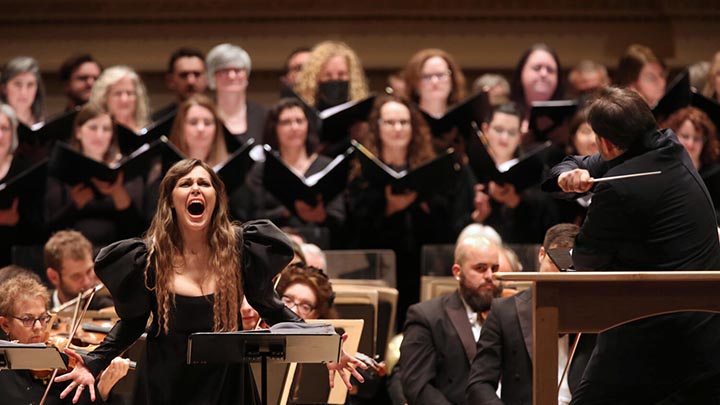
As a capstone to the BSO’s decade-long exploration of the music of Dmitri Shostakovich, Nelsons programmed a complete concert performance of his still-shocking opera Lady Macbeth of Mtsensk, which he brought to New York after two performances back home in Symphony Hall. He showed how music gives voice to the drama throughout this lurid tale of Russian social mores.
Despite a raft of committed performances from the capable singers recruited for the assignment, the orchestra remained the star throughout. With players pushed nearly to the lip of the Stern Auditorium stage—both to accommodate the score’s massive orchestration and the Tanglewood Festival Chorus, who sang superbly under James Barton’s preparation, forming a judgmental, ever-glaring society—the evening’s dramatic impetus flowed through the music.
Softer passages were taken with a surprising tenderness, and moments that could descend into high camp—as when Katerina Izmailova, the title vamp, poisons her father-in-law Boris with mushrooms—instead emerged with subtlety. Nelsons handled musical interludes with intense focus, whether they represented the sexual freedom Katerina feels for her lover Sergei, or the pair’s eventual trek to a Siberian labor camp. The multiple forte passages made every hair on your body stand at attention.
Yet for a performance so musically satisfying, the evening was also dramatically inert. I need not rehash the astute commentary of my parterre colleague Harry Rose, who reviewed the Boston engagement over the weekend. But it bears repeating that this work cries out for a dramatic vision, one that felt stifled by the largely stand-and-deliver theatrics on display here. Had a touch more thought been expended on the storytelling, this could have been an ideal rendering of a thorny work.
Still, Kristine Opolais soldiered through the long, taxing title role with admirable stamina, and while the voice rarely shaded any color during the three-and-a-half hour performance, it also never flagged. Because the Latvian soprano’s current vocal estate doesn’t allow for much expressivity in terms of vocal variation, she made her points through fearless high attacks and outbursts that managed to sail above the orchestra even at full volume. She found dramatic moments wherever she could, as when Katerina removes her stockings at Sergei’s request—so that he can give them to his prison lover, Sonyetka. Opolais gamely lifted her dress and performed the final moments barefoot, looking both crushed and angered as she realized her partner’s transgression.
Opolais’s outing here felt like a performance in limbo, a cascade of ideas waiting to be unified. One hopes that she can ultimately realize her strong instincts one day. And when she does, I hope she’ll bring Brenden Gunnell, who brought a virile tone to Sergei’s taxing music, and Peter Hoare, who made for a preening Zinovy, the cuckolded husband, with her. And although Marina Barakova surely has more choice assignments in her future, she was luxuriously cast (and in equally luxurious voice) as Sonyetka.
Günther Groissb?ck deployed a sinister vibe as Boris, although his voice has grown wan and worn of late. The somewhat shaggy dimensions of Dmitry Belosselskiy’s current vocal estate suited the sad nature of the Old Convict, but it was a stark contrast to his former beauty of tone. It was noticeable when Anatoli Sivko, in the relatively small role of the Police Inspector, opened his mouth and sang his low-voiced colleagues off the stage, showing off a bass-baritone that is destined for stardom.
The lack of theatricality will hardly matter to those who encounter this performance on a forthcoming Deutsche Grammaphon recording. Still, the overall event felt like a missed opportunity, so close to perfection that you could smell it. But it proved once and for all that the BSO is in good hands. Where will Nelsons take them next, now that the Shostakovich cycle is over? Presumably we’ll have decades to find out.
Photos: Steve Sherman



























Comments